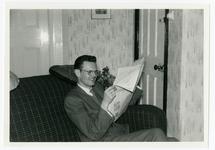The Reverend Robert (Bob) Leith Thomson (1924-2006) was a distinguished Celtic scholar and leading authority on Manx Gaelic. Obtaining a place at the University of Leeds in 1942, his studies were interrupted for a year as he conducted his war service with the Royal Signals, before finally achieving a first-class degree in Latin and English in 1949. Leeds awarded Thomson with a Lady Elizabeth Hastings Scholarship, enabling him to read for a Diploma in Comparative Philology in Celtic and Germanic Languages at Queen's College, University of Oxford. It was here Thomson established his interest in Manx Gaelic - writing an essay in (near fluent) Welsh on Manx literature. Thomson moved to Glasgow and through a scholarship for advanced studies in the Arts, he achieved his Bachelor of Letters (BLitt) on the history and development of Manx Gaelic from the University of Glasgow.
In 1953 Thomson joined the department of English Language and Medieval English Literature at the University of Leeds, holding the position of assistant lecturer. By 1955 he was promoted to lecturer and awarded a Master in Arts (MA) in 1958. Becoming senior lecturer in 1964, Thomson then received the title Reader in Celtic in 1971. Thomson's influence at Leeds allowed the English department to offer a postgraduate Diploma MA in Celtic Studies (the only University in the country to offer this at the time). He was the leading authority on the Manx language, covering topics such a Manx phonetics, place names, surnames, medieval history, the influence on Norse on Manx, lexicography and translations of the Bible into Manx. His work on Celtic Studies led to several invitations to lecture throughout the British Isles including a lecture for the Sir John Rhys Memorial Lecture at the British Academy in 1969. Thomson's knowledge on other Celtic Studies included Welsh, Scottish Gaelic, Irish and Cornish, publishing texts on medieval Welsh and early modern Scots Gaelic. Further publications included the revision of Edwin Goodwin's First Lessons in Manx (1965), Further Lessons in Manx (1981), Outline of Manx Language and Literature (1988) and a glossary for Bishop Phillip's Book of Common Prayer of 1610 .
Within the University of Leeds, Thomson served as a Director for the Centre for Medieval Studies, was chairman of the Medieval Group, a supervisor for examinations and was a member of the University Court. He also dedicated time supervising external examinations in Celtic at the Universities of Edinburgh and Glasgow and in English Language at the University of Manchester. From 1953 to 1959 he was secretary for the Yorkshire Society for Celtic Studies, becoming president in 1963 to 1965.
In 1983 Thomson retired from the University of Leeds, moved to the Isle of Man and occupied a house at Friary Park, Ballabeg in the south of the Island. As well as continuing numerous scholarly projects, Thomson was a member and chairman of Coonceil ny Gaelgey (the Manx Gaeilic Advisory Council), a Trustee for Manx National Heritage and Vice-President of the Isle of Man Natural History and Antiquarian Society (later President in 1986). In 1987 he became Hon. Field and Research Co-ordinator for the Society, serving in this role until his retirement from society business in 2005. Religion played a significant part in Thomson's life and after his retirement he was ordained a priest, serving as minister at St Andrew's United Reformed Church, Douglas from 1989 until 1999. In 1994 Culture Vannin (an organisation promoting Manx culture, heritage and language) presented Thomson with the Reih Bleeaney Vanannan award, in recognition for his outstanding work on the Manx language. The Revd Robert Thomson died on 13 October 2006 aged 82, leaving a generous bequest to Manx National Heritage. His funeral service was conducted at St Andrew's United Reformed Church, Douglas.

